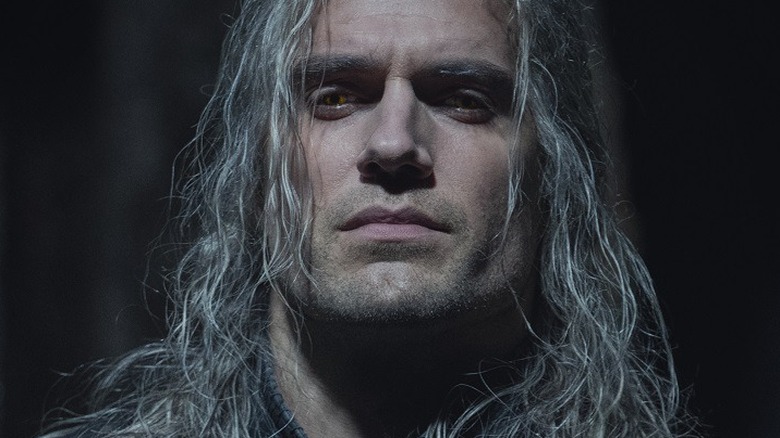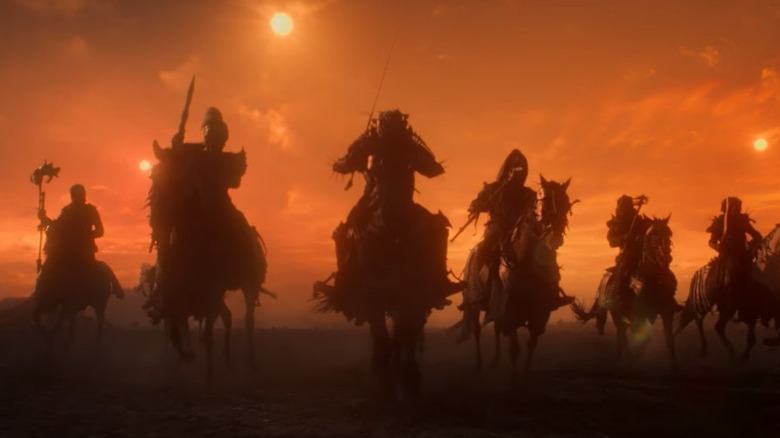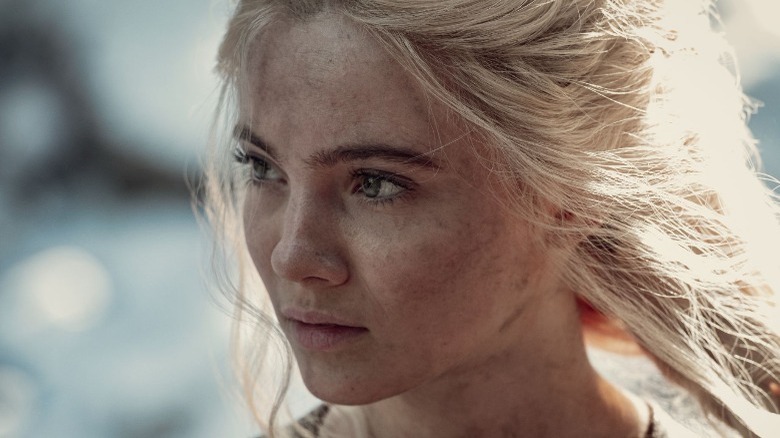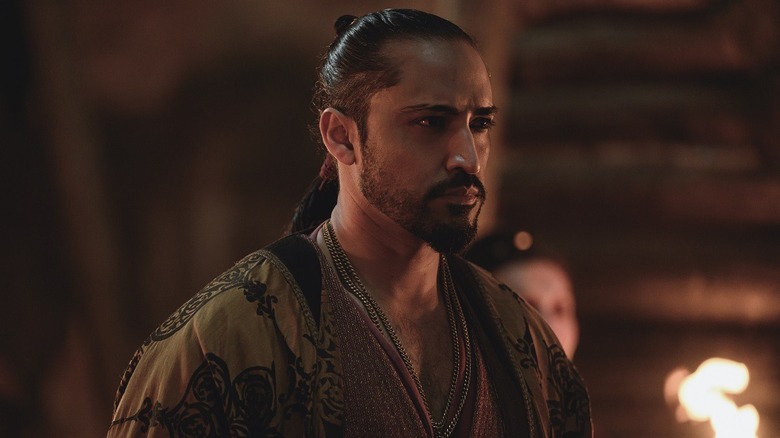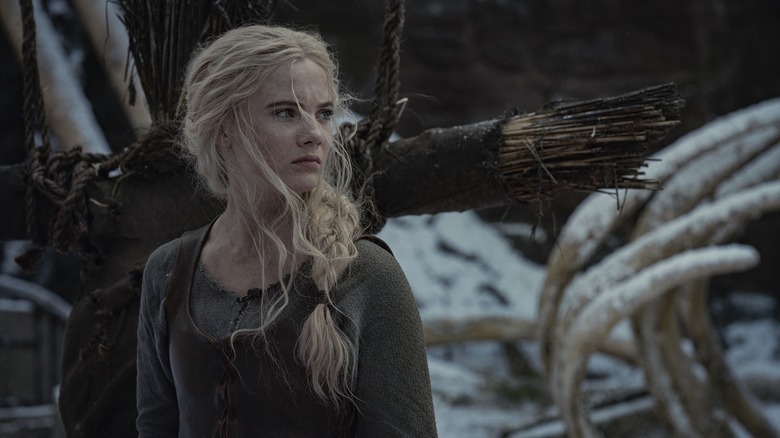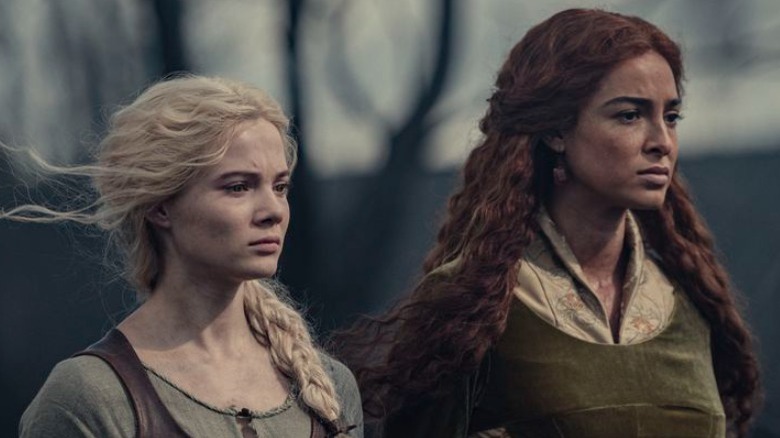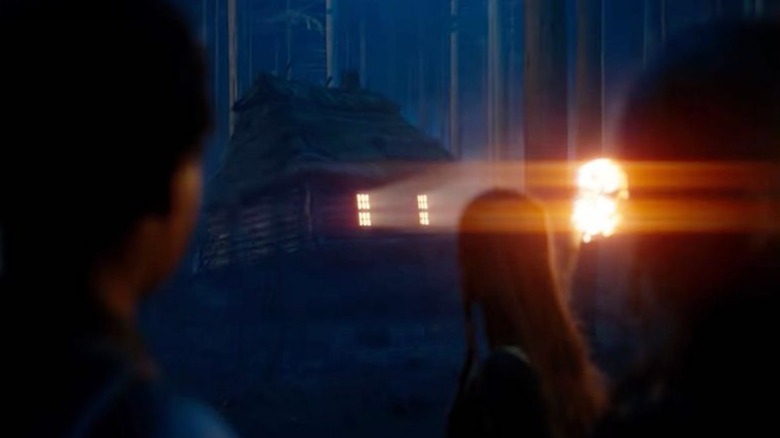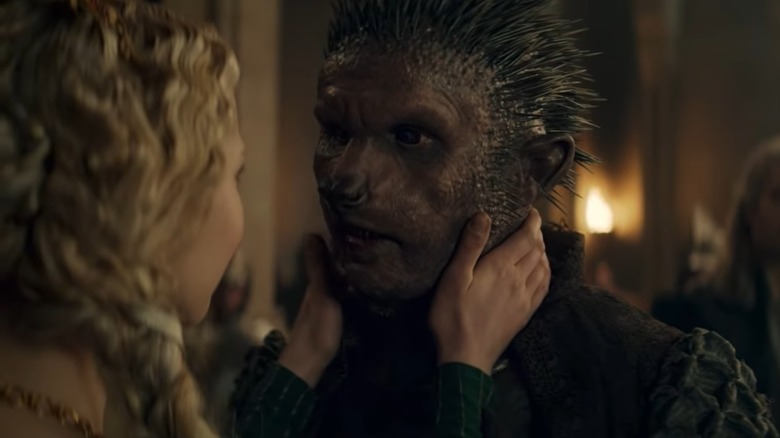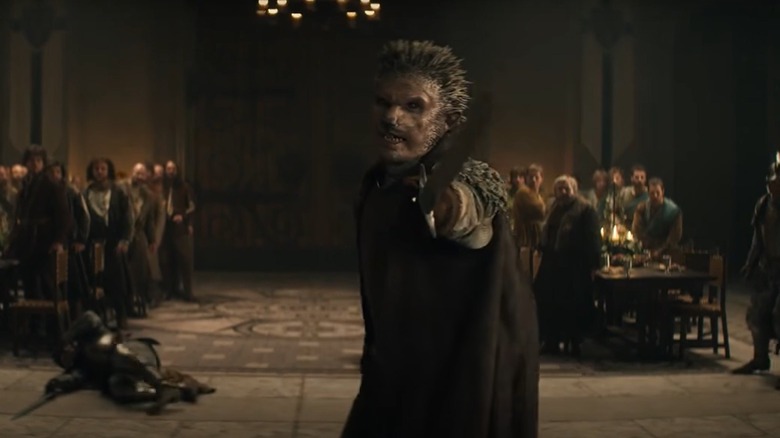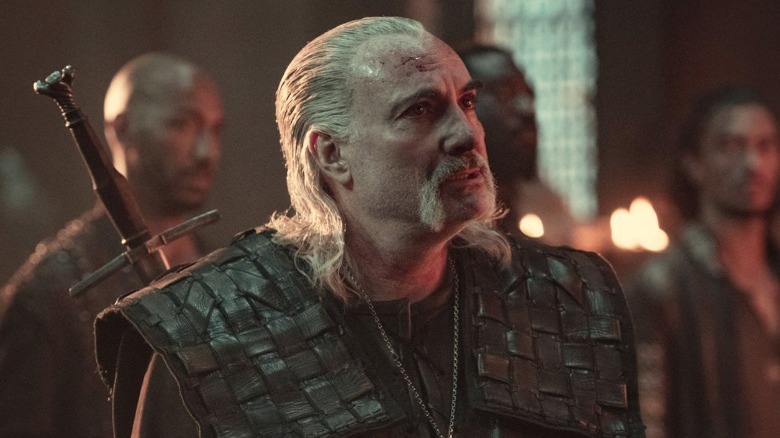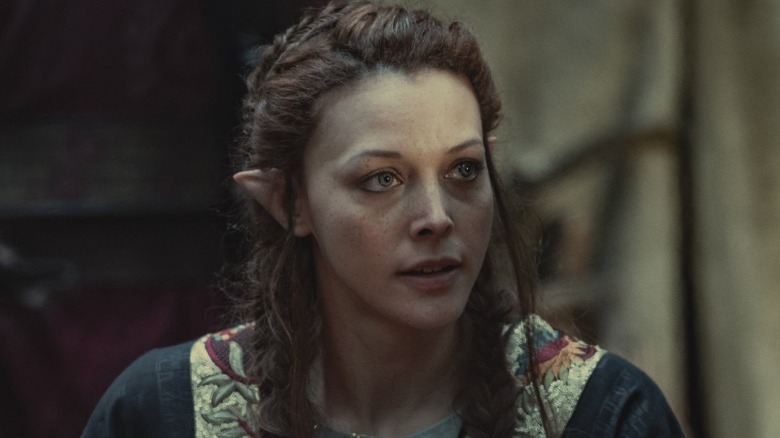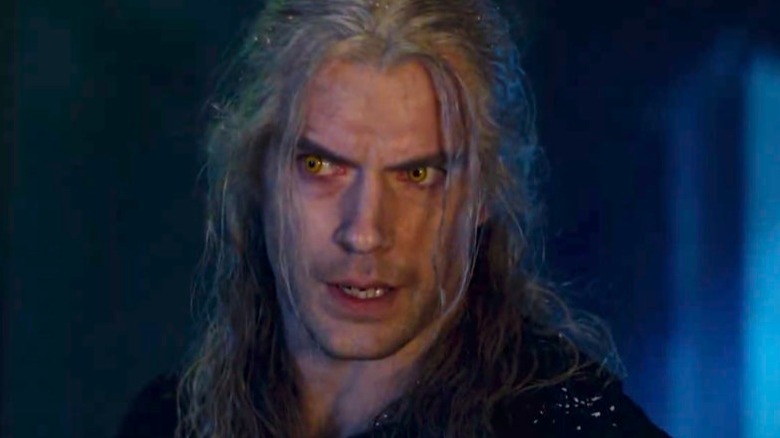Biggest Unanswered Questions In The Witcher Season 2
"The Witcher" became everyone's favorite fantasy series when the first season hit Netflix in 2019. And now, the tale of Geralt, Ciri, and Yennefer is back again with Season 2, which more than satisfied our need for awesome action, incredible creatures, and all sorts of magic.
At the end of the second season, the elves, the Deathless Mother, the Wild Hunt, the Nilfgaardians, and the Brotherhood are all out to get Ciri. And while Geralt can train the princess to become a formidable fighter, Yennefer can help her hone her magical abilities heading into Season 3. At the same time, things have gotten even more complicated thanks to the big twist involving Emperor Emhyr.
But with so much happening in Season 2, it's bound to leave a few fans scratching their heads, and we're here to look at the other side of the coin and examine the biggest unanswered questions from "The Witcher" Season 2.
Warning — there are major spoilers below.
Who or what is the Wild Hunt?
Perhaps one of the biggest plot threads hanging in the balance at the end of Season 2 is that of the Wild Hunt. These wraiths were mentioned multiple times throughout the season, and Geralt, Yennefer, and Ciri caught a frighteningly up-close glimpse of the death riders during the final moments of the season when they were transported to another "sphere" by Ciri's magic. But the question remains — who are these omens of death, and why do they want Ciri?
Well, Ciri's Elder blood is apparently important to many factions by the time the climactic finale rolls its credits, and that's why the Wild Hunt are in pursuit. But more importantly, who are the members of this ghastly crew? While they might seem mysterious to us, Geralt understands their nature to a degree as he tells Vesemir that he's taking Ciri away from Kaer Morhen. Now that he knows the Wild Hunt is hot on her trail, Geralt understands their persistence and states that they must keep moving to stay ahead of these otherworldly enemies.
Where do the creatures that emerge from the monoliths come from?
Ciri's power is eldritch and arcane, stemming from her elven lineage. Of course, she has little understanding of her abilities, and her grandmother, Queen Calanthe, did nothing to enlighten her. We often see that her power is manifested at random mostly through her emotions. She's referred to as a "source" –- one with magnitudes of power beyond mere mages but has no control over it.
As a result, Ciri has mistakenly drawn creatures from other "spheres" through mysterious monoliths (like the one she fractured in the first season when confronted by Cahir outside of Cintra). As a monster hunter with an encyclopedic knowledge of countless species, their anatomy, and their weakness, Geralt has no knowledge of the new creatures that have emerged from these monoliths. But Geralt has stated that the Wild Hunt and the Deathless Mother were from other spheres, with the implication that these are alternate worlds or universes. In fact, when our heroes crossed to other side of the portal, they found themselves in a world with three suns. In other words, there's still much we don't know about these spheres and where they're located.
What are Vilgefortz's plans?
At the battle of Sodden Hill, we see Vilgefortz's treachery when we witness him sink a mace into a Northern colleague. Instantly, this makes the conniving mage a traitor, but to what end?
Well, in the second season, Vigelfortz is vying for a seat on the Council in Aretuza. Together with Tissaia, the two make a compelling team, and it's revealed that they now share an intimate relationship. That means it's not so great for Triss when she returns to Aretuza and tells Tissaia of her and Ciri's significance. Shortly after, Tissaia betrays Triss' confidence, sharing this info with Vilgefortz.
Upon learning of Ciri, Vilgefortz is adamant that she is pursued. Ultimately, the Brotherhood puts a bounty on her head and on anyone attempting to protect her. Vilgefortz clearly has a hidden allegiance or agenda, and in the games, it was shown that he had strong ties to Emperor Emhyr of Nilfgaard. It remains to be seen what the full scope of his intentions are as he seemingly manipulates his colleagues to his own ends.
What would've happened had Ciri taken the Witcher mutagen?
For a time, Ciri was so in awe of Geralt's prowess in the realm of rooting out and defeating monsters that she became hellbent on becoming a Witcher herself. The only problem with that idea is that Vesemir sullenly revealed that the formula for creating the Witcher mutagen had been destroyed long ago, rendering them incapable of making more Witchers. However, when Triss reveals that Ciri has Elder blood, Vesemir's hope is renewed. He asks Ciri's permission to begin creating the mutagen once again. Ciri agrees on one condition — she gets the first taste.
While becoming a Witcher requires vigorous training, the most crucial element is the mutation they undergo that refines their senses, reflexes, and strength. Unfortunately, most Witcher candidates die during the Trial of the Grasses –- the process of receiving the alchemical concoction to undergo the necessary changes. But those who survive manage to live a new life with superior senses. Ciri is willing to take the risk, but Geralt is not. He stops her from making, perhaps, one of the greatest mistakes she could possibly make.
However, the question remains ... what would've happened had Ciri actually taken the mutagen? It's clear that there are no female Witchers that occupy Kaer Morhen. Would Ciri have become the first? If so, would her magical abilities have been amplified? It's a question we may never receive the answer to, but it's one that's fun to ponder nonetheless.
Will Ciri cause mass destruction as foreseen by Triss?
While at Kaer Morhen, Triss and Ciri begin to bond as Triss helps her to uncover her past. Triss uses her magic to take the princess on a trip through a dreamscape that Triss is seemingly in control of. By the end, however, Triss begins to fear as the visages of people within the dreamscape actually see her — something that isn't supposed to occur. Furthermore, Ciri gets her first view of the Wild Hunt, a pack of wraiths who appear as ghostly specters of death upon horses. Triss is also seemingly assaulted and choked in the moment.
When the two emerge from the dreamscape, Triss fears Ciri and claims that she'll destroy everything and flees. All throughout Season 2, many people are telling Ciri who she is and what she can become. Triss' view was the only one that stemmed from fear of the Cintran princess possibly bringing about the apocalypse. While Geralt's most important priority is to care for and protect Ciri, others view her as either pawn in political strategy over Cintra, a weapon, or a powerful asset. And, of course, the Wild Hunt apparently views her as the next addition to their crew. Will Ciri fulfill Triss' fears of death and destruction? Only time will tell.
What are the origins of the Deathless Mother?
Fringilla, Francesca, and Yennefer all encountered the woman in the hut — someone who manipulated them and fed off their pain and despair. Known as Voleth Meir, she bargained with Yennefer to bring her Ciri in exchange for the restoration of her chaos (magic). Feeling a sense of worthlessness, Yennefer became a willing participant but ultimately came to her senses as she bonded with Ciri and understood her importance. However, it was too late as Voleth Meir fed off the pain and anguish that Francesca felt over the loss of her murdered child, which released her from the hut that the first Witchers had previously banished her to.
Geralt was all too familiar with Voleth Meir and her history with the first Witchers. Ultimately, it was revealed that she wanted Ciri because the princess was the only one who could return her home to her own sphere. After all, we learned that Ciri had the power to pull monsters and creatures into the world from monoliths that were linked to a network of these spheres. So that begs the question, if Voleth Meir was from another sphere, she clearly existed before Ciri was ever born. So how did she come to inhabit this world and come to blows with the Witchers of years past? Did someone else like Ciri pull her into this world?
Why did Duny abandon his daughter, and where is Pavetta?
The big reveal at the end of Season 2 is that the leader of Nilfgaard is none other than Emperor Emhyr Var Emreis, who's revealed to be Ciri's father. He was formerly known as Duny and sworn to marry Princess Pavetta of Cintra, and Ciri is their daughter, who was left in the care of Queen Calanthe.
Of course, in the Netflix series, it hasn't been made clear what happened to Ciri's parents. Their fates are ultimately revealed in the novels, and for the sake of keeping that plot unspoiled for viewers of the show, we won't share it here. However, we do know that Duny is actually Emperor Emhyr. Of course, Emhyr states his intent of finding Ciri, but why did he leave her in the first place? It's likely that the next season will shed more light on Emhyr and his history between the time that he was protected as Duny by Geralt and his present status as ruler of Nilfgaard.
Why is Emperor Emhyr a tyrant and enemy of his daughter's homeland?
There are several questions that now emerge with the reveal of Emperor Emhyr. Sure, he seemingly abandoned his daughter for many years, but why is he a sworn enemy of Cintra and the Northern Kingdoms? What does his conquest truly afford him? Cintra was the home of his beloved Princess Pavetta, who he fell madly in love with. He risked his life for her hand in marriage, and they, of course, had a daughter. After managing to claim leadership over Nilfgaard, why then would he destroy Cintra, resulting in the deaths of his mother-in-law, Queen Calanthe, and potentially cause harm to his daughter, Ciri?
In the first season, Duny seemed timid yet honorable. He claimed to have once saved the life of the king of Cintra, which granted him the Law of Surprise. He only sought what was rightfully his within the bounds of ancient law. Geralt even defended him when he saw that Duny was being treated unjustly by Queen Calanthe, which ultimately granted Geralt the Law of Surprise as well. Nothing in Duny's nature ever indicated he was a bloodthirsty tyrant willing to kill babies to sow chaos. What exactly happened to Duny after all these years that turned him into the dreaded emperor of Nilfgaard?
Will the Witcher order continue?
As previously indicated, Ciri offered Vesemir a chance at restoring the Witcher order. He created his first batch of mutagen with her blood and was prepared to put Ciri through the Trial of the Grasses in order to fulfill her wish of becoming a Witcher, even if it could've potentially killed her. Ultimately, Geralt put a stop to the madness and ensured Ciri and Vesemir didn't do something they both might regret.
However, now Vesemir has a sample of the mutagen. And if Ciri ever decided to donate blood again to the Witcher cause, they could potentially create even more. Will Vesemir and his Witcher brothers at Kaer Morhen begin training and finding new potential candidates for Witchers once again? It seems that it's now within their capability to do so. But it may not be within Ciri's destiny to participate in the Witcher resurgence. We'll have to wait and see what the future holds for the Witcher order in the next season.
Will there be consequences for Francesca's vile actions in Redania?
In the climactic moments of Season 2, a silent assassin kills Filavandrel and Francesca's child. Dara's apparent confession sends the elves on a vengeful quest to Redania where they repay the crimes committed toward them a hundredfold. Francesca uses magic to slaughter the babies of Redania in a vile act that could threaten the standing of the elves in the world order even further.
"The Witcher" has shown a long a painful legacy of the mistreatment of elves by humankind. They've been persecuted, slaughtered, and discarded. Their plight is emblematic of the racism, prejudices, and biases that have plagued the history of our own world. After finding an apparent ally in Nilfgaard and a home where they felt accepted for a short while, it becomes all too clear that Fringilla is merely using them for the muscle they employ.
The birth of Francesca's child ultimately swayed the elves to rebuild instead of go to war for Nilfgaard. Because of this notion, their child was murdered –- by the orders of Emperor Emhyr no less. Once again, they'd become pawns in Nilfgaard's game of conquest. But now, they threaten everything they've worked for by sullying their name with the actions committed in Redania, and we wonder what kind of consequences they're going to face in Season 3.
Will Geralt ever forgive Yennefer?
Geralt and Yennefer are two of the most prominent characters in the entire series, and they're known for their passionate romance and feelings toward one another –- something Geralt never exhibited previously. In both the books and video games, they enjoy a lengthy on-again, off-again relationship that endures no matter the hardships and struggles they face. But now, Geralt is faced with the Yennefer's apparent betrayal as she'd planned to offer Ciri up to the Deathless Mother in exchange for her magic. While Yennefer didn't go through with her plan in the end, the moment still cut Geralt rather deeply.
In the end, he tells Yennefer that he can't forgive her. However, he needs her to train Ciri and help her hone her abilities. Can Geralt find it in his heart to move past a moment of bad judgement? After all, he knows what it's like to feel empty inside and without purpose. If the history of these two characters in other mediums have taught us anything, it's that they'll surely find their way back to each other once again.
